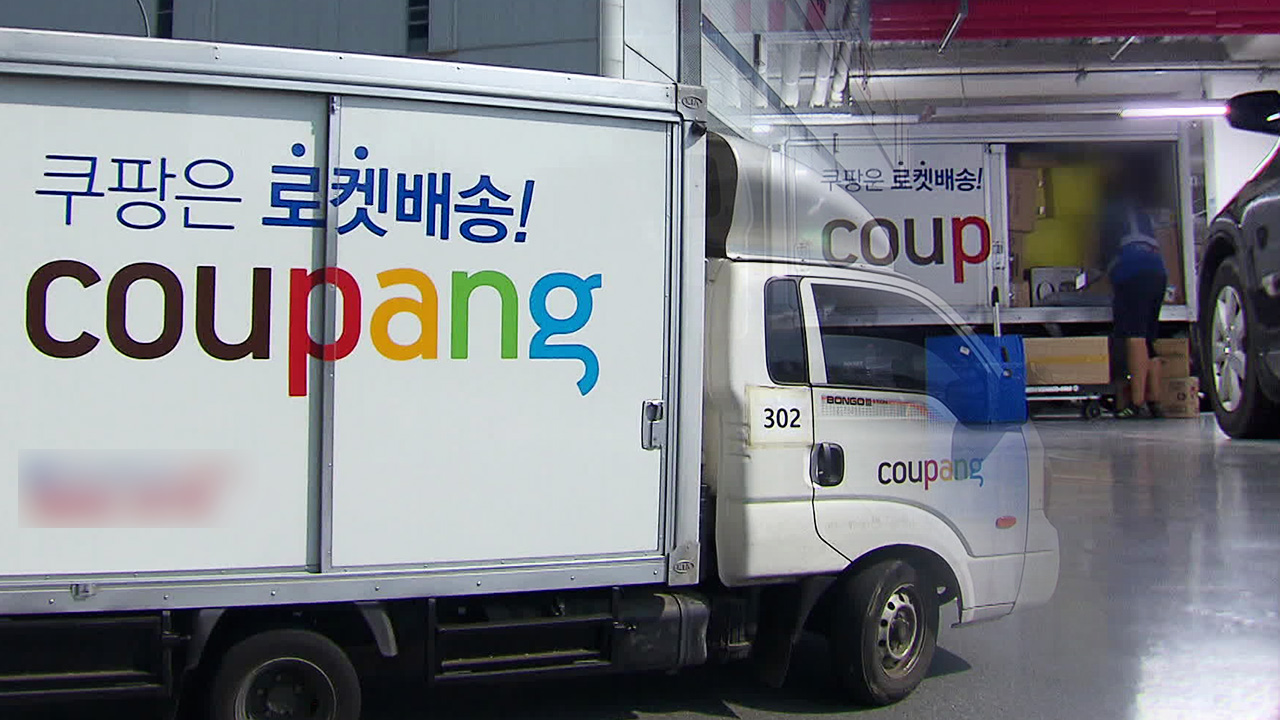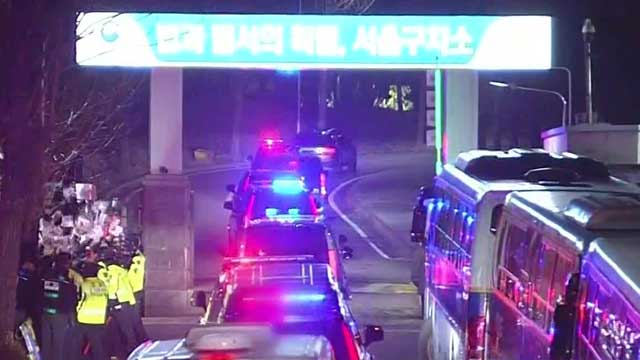[Exclusive] Coupang delivery hearing
입력 2025.01.19 (01:13)
읽어주기 기능은 크롬기반의
브라우저에서만 사용하실 수 있습니다.
[Anchor]
Our reporting team has obtained the results of an investigation into the working conditions of Coupang's early morning delivery drivers, following a series of fatal accidents last year.
Three-quarters of the delivery drivers at the agency are performing a "three-round" delivery, making three trips through their delivery areas every night.
Kim Chae-rin reports exclusively.
[Report]
In May of last year, 'Rocket Delivery' driver Jeong Seul-ki passed away.
He worked under a consignment contract with a Coupang CLS agency, rather than an employment contract.
Recognized as a work-related death due to overwork, Jeong delivered an average of 279 packages a day using the so-called "three-round" delivery method.
To complete the early morning deliveries, he traveled through his delivery area three times every night between 9 PM and 7 AM.
[Jeong Geum-seok/Father of the late Jeong Seul-ki/Jan. 14th: "(The delivery) camp and the area my son delivered in, Sangbong-dong, is about 20 km away. He was going back and forth three times there."]
This level of work intensity is not unique to Jeong.
This is the result of a survey conducted by the Ministry of Employment and Labor, obtained by KBS.
Among the 767 agency delivery drivers who responded, 76.8%, or three out of four, were doing three-round deliveries at night.
76.4% reported delivering more than 250 packages a day.
In contrast, among drivers directly employed by Coupang CLS, the rate of three-round deliveries is 38%, and those delivering more than 250 packages is in the 10% range.
Despite the high-intensity work, their working hours also exceeded the legal working hours.
The average working hours per day was 9 hours and 26 minutes, and they worked an average of 5.5 days a week.
Notably, 77% responded that they would "absolutely deliver" even in bad weather conditions such as heavy rain or snow.
[Kim Joo-young/Member of the National Assembly Environment and Labor Committee/Democratic Party: "The labor environment that can put a strain on the body has been revealed through this investigation. We can see that more careful regulation of working hours is necessary."]
These special employment delivery drivers, referred to as Quickflexers, are indirectly employed by Coupang and receive delivery fees per package.
The Ministry of Labor recently pointed out that while they are not considered employees under the Labor Standards Act, there is a need for improvement in their working conditions.
Coupang has not issued a separate statement regarding the results of this investigation.
A 'Coupang hearing' is scheduled to take place in the National Assembly on the 21st.
This is KBS News Kim Chae-rin.
Our reporting team has obtained the results of an investigation into the working conditions of Coupang's early morning delivery drivers, following a series of fatal accidents last year.
Three-quarters of the delivery drivers at the agency are performing a "three-round" delivery, making three trips through their delivery areas every night.
Kim Chae-rin reports exclusively.
[Report]
In May of last year, 'Rocket Delivery' driver Jeong Seul-ki passed away.
He worked under a consignment contract with a Coupang CLS agency, rather than an employment contract.
Recognized as a work-related death due to overwork, Jeong delivered an average of 279 packages a day using the so-called "three-round" delivery method.
To complete the early morning deliveries, he traveled through his delivery area three times every night between 9 PM and 7 AM.
[Jeong Geum-seok/Father of the late Jeong Seul-ki/Jan. 14th: "(The delivery) camp and the area my son delivered in, Sangbong-dong, is about 20 km away. He was going back and forth three times there."]
This level of work intensity is not unique to Jeong.
This is the result of a survey conducted by the Ministry of Employment and Labor, obtained by KBS.
Among the 767 agency delivery drivers who responded, 76.8%, or three out of four, were doing three-round deliveries at night.
76.4% reported delivering more than 250 packages a day.
In contrast, among drivers directly employed by Coupang CLS, the rate of three-round deliveries is 38%, and those delivering more than 250 packages is in the 10% range.
Despite the high-intensity work, their working hours also exceeded the legal working hours.
The average working hours per day was 9 hours and 26 minutes, and they worked an average of 5.5 days a week.
Notably, 77% responded that they would "absolutely deliver" even in bad weather conditions such as heavy rain or snow.
[Kim Joo-young/Member of the National Assembly Environment and Labor Committee/Democratic Party: "The labor environment that can put a strain on the body has been revealed through this investigation. We can see that more careful regulation of working hours is necessary."]
These special employment delivery drivers, referred to as Quickflexers, are indirectly employed by Coupang and receive delivery fees per package.
The Ministry of Labor recently pointed out that while they are not considered employees under the Labor Standards Act, there is a need for improvement in their working conditions.
Coupang has not issued a separate statement regarding the results of this investigation.
A 'Coupang hearing' is scheduled to take place in the National Assembly on the 21st.
This is KBS News Kim Chae-rin.
■ 제보하기
▷ 카카오톡 : 'KBS제보' 검색, 채널 추가
▷ 전화 : 02-781-1234, 4444
▷ 이메일 : kbs1234@kbs.co.kr
▷ 유튜브, 네이버, 카카오에서도 KBS뉴스를 구독해주세요!
- [Exclusive] Coupang delivery hearing
-
- 입력 2025-01-19 01:13:18

[Anchor]
Our reporting team has obtained the results of an investigation into the working conditions of Coupang's early morning delivery drivers, following a series of fatal accidents last year.
Three-quarters of the delivery drivers at the agency are performing a "three-round" delivery, making three trips through their delivery areas every night.
Kim Chae-rin reports exclusively.
[Report]
In May of last year, 'Rocket Delivery' driver Jeong Seul-ki passed away.
He worked under a consignment contract with a Coupang CLS agency, rather than an employment contract.
Recognized as a work-related death due to overwork, Jeong delivered an average of 279 packages a day using the so-called "three-round" delivery method.
To complete the early morning deliveries, he traveled through his delivery area three times every night between 9 PM and 7 AM.
[Jeong Geum-seok/Father of the late Jeong Seul-ki/Jan. 14th: "(The delivery) camp and the area my son delivered in, Sangbong-dong, is about 20 km away. He was going back and forth three times there."]
This level of work intensity is not unique to Jeong.
This is the result of a survey conducted by the Ministry of Employment and Labor, obtained by KBS.
Among the 767 agency delivery drivers who responded, 76.8%, or three out of four, were doing three-round deliveries at night.
76.4% reported delivering more than 250 packages a day.
In contrast, among drivers directly employed by Coupang CLS, the rate of three-round deliveries is 38%, and those delivering more than 250 packages is in the 10% range.
Despite the high-intensity work, their working hours also exceeded the legal working hours.
The average working hours per day was 9 hours and 26 minutes, and they worked an average of 5.5 days a week.
Notably, 77% responded that they would "absolutely deliver" even in bad weather conditions such as heavy rain or snow.
[Kim Joo-young/Member of the National Assembly Environment and Labor Committee/Democratic Party: "The labor environment that can put a strain on the body has been revealed through this investigation. We can see that more careful regulation of working hours is necessary."]
These special employment delivery drivers, referred to as Quickflexers, are indirectly employed by Coupang and receive delivery fees per package.
The Ministry of Labor recently pointed out that while they are not considered employees under the Labor Standards Act, there is a need for improvement in their working conditions.
Coupang has not issued a separate statement regarding the results of this investigation.
A 'Coupang hearing' is scheduled to take place in the National Assembly on the 21st.
This is KBS News Kim Chae-rin.
Our reporting team has obtained the results of an investigation into the working conditions of Coupang's early morning delivery drivers, following a series of fatal accidents last year.
Three-quarters of the delivery drivers at the agency are performing a "three-round" delivery, making three trips through their delivery areas every night.
Kim Chae-rin reports exclusively.
[Report]
In May of last year, 'Rocket Delivery' driver Jeong Seul-ki passed away.
He worked under a consignment contract with a Coupang CLS agency, rather than an employment contract.
Recognized as a work-related death due to overwork, Jeong delivered an average of 279 packages a day using the so-called "three-round" delivery method.
To complete the early morning deliveries, he traveled through his delivery area three times every night between 9 PM and 7 AM.
[Jeong Geum-seok/Father of the late Jeong Seul-ki/Jan. 14th: "(The delivery) camp and the area my son delivered in, Sangbong-dong, is about 20 km away. He was going back and forth three times there."]
This level of work intensity is not unique to Jeong.
This is the result of a survey conducted by the Ministry of Employment and Labor, obtained by KBS.
Among the 767 agency delivery drivers who responded, 76.8%, or three out of four, were doing three-round deliveries at night.
76.4% reported delivering more than 250 packages a day.
In contrast, among drivers directly employed by Coupang CLS, the rate of three-round deliveries is 38%, and those delivering more than 250 packages is in the 10% range.
Despite the high-intensity work, their working hours also exceeded the legal working hours.
The average working hours per day was 9 hours and 26 minutes, and they worked an average of 5.5 days a week.
Notably, 77% responded that they would "absolutely deliver" even in bad weather conditions such as heavy rain or snow.
[Kim Joo-young/Member of the National Assembly Environment and Labor Committee/Democratic Party: "The labor environment that can put a strain on the body has been revealed through this investigation. We can see that more careful regulation of working hours is necessary."]
These special employment delivery drivers, referred to as Quickflexers, are indirectly employed by Coupang and receive delivery fees per package.
The Ministry of Labor recently pointed out that while they are not considered employees under the Labor Standards Act, there is a need for improvement in their working conditions.
Coupang has not issued a separate statement regarding the results of this investigation.
A 'Coupang hearing' is scheduled to take place in the National Assembly on the 21st.
This is KBS News Kim Chae-rin.
-
-

김채린 기자 dig@kbs.co.kr
김채린 기자의 기사 모음
-
이 기사가 좋으셨다면
-
좋아요
0
-
응원해요
0
-
후속 원해요
0











![[속보] 경찰, 서부지법 난동 이틀간 86명 연행…“끝까지 추적”](/data/news/2025/01/19/20250119_zADBDR.jpg)



이 기사에 대한 의견을 남겨주세요.